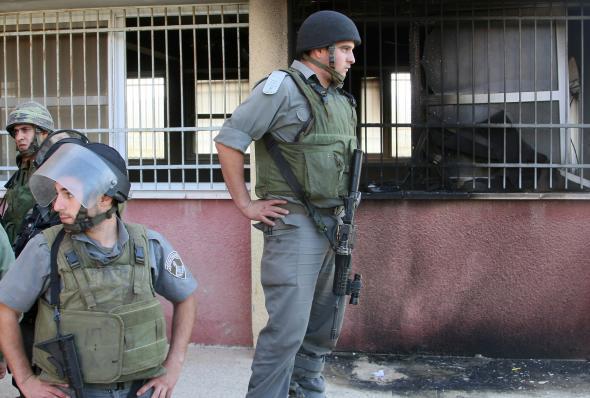Israeli Prime Minister Benjamin Netanyahu has put in a condolence call to the father of Mohammed Abu Khudair, the Palestinian teenager killed last week in what appears to be a revenge attack for the abduction killing of three Jewish youths. The events have the country at its highest level of tension in years. Six Jews have reportedly been arrested in connection with the attack on Khudair. Netanyahu, along with other senior government officials, publicly condemned the killing, but drew a distinction between his government’s response and that of the Palestinian Authority to the earlier murders:
“I know that in our society, the society of Israel, there is no place for such murderers,” Netanyahu said. “And that’s the difference between us and our neighbors. They consider murderers to be heroes.”
But it’s also been clear for some time that the Israeli government has been too hesitant in cracking down on so-called price-tag attacks perpetrated by settler extremist groups in retaliation for either Palestinian violence or Israeli government concessions. The current wave of price-tag violence grew out of resentment by settlers following Israel’s 2005 withdrawal from Gaza and has continued to pick up steam. The Washington Post reported last summer:
Now, the attacks are growing and so are the targets, which include not only Muslims in the West Bank and Israel, but left-leaning activists, as well as Christian schools, churches and monasteries, which vandals have tagged with graffiti.
According to civil rights groups, price-tag attacks have grown from a handful in 2008 to 23 so far this year. One group counts more than 20 incidents at mosques and churches since 2010. There were three price-tag incidents in June in neighborhoods and towns around Jerusalem.
The attacks have at times been more dangerous, including the firebombing of a Palestinian taxi and the attempted lynching of several Palestinian teens by a group of Israeli teenagers, which came on the same day in 2012. An attack on an Israeli army base by West Bank settlers in 2011 was described by Defense Minister Ehud Barak as “homegrown terror.” The U.S. State Department began listing price-tag attacks as acts of terrorism in 2012.
While the attacks have been widely condemned in Israel, the response by authorities can charitably described as sluggish. According to one report, between 2005 and 2013, 992 investigations of complaints of Israeli violence against Palestinians were launched but only 7.8 percent of them led to indictments.
As Daniel Byman and Natan Sachs have argued, a large part of the problem is the state of legal limbo created by the occupation of the West Bank. While Israeli police have authority over criminal disputes between Israeli citizens, “the military governs most aspects of public life, from security to construction permits,” and with the overall level of violence low until the last few weeks, the Israeli Defense Forces felt little public pressure to focus on protecting Palestinians from settler violence. Despite this, the IDF has on several occasions been the target of settler attacks.
Plus, as my colleague Will Saletan pointed out last week, the rhetoric of collective punishment coming from even mainstream Israeli politicians makes it not exactly surprising that extremists are taking matters into their own hands.
Israel’s “homegrown terror” problem has been relatively easy to ignore so far because the level of violence, in the larger picture of the Israeli-Palestinian conflict, has been relatively low. Despicable as they may be, incidents of vandalism and arson aren’t on the same level of destructiveness as suicide bombings or rocket attacks, and they mostly occurred at a time when an uneasy status quo prevailed in the area.
Now, with levels of tension an order of magnitude higher, an much more tragic incident of extremist violence will hopefully force the Israeli government to finally confront a problem that poses a threat not just to the safety of Palestinians but to the Jewish state’s own long-term security interests.
But they can’t exactly say the warning signs weren’t there.
